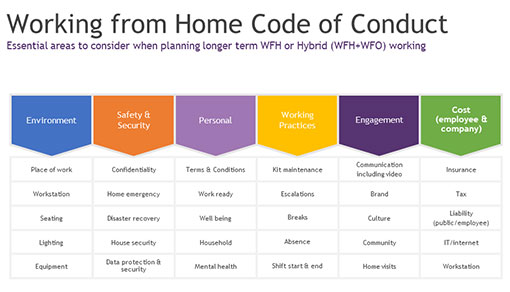We share ten tips for improving performance in your remote contact centre, which have been shared with us by industry experts.
The first five tips for remote working are shared with us by our experts in the video above.
If you are just looking to scan the tips, they are also written out below.
1. Respect People’s Boundaries
With the switch to remote working, many of us have failed when it comes to detaching ourselves from our jobs. We have not been able to experience the things that we would have otherwise done in life.
It’s difficult to get together with friends and it’s difficult to see family, so what many of us have done is filled that void with work.

Justin Robbins
With this being the case, the number-one mistake that business leaders are now making is in losing their sense of boundaries.
They are sending emails at all hours of the day and they are not giving advisors permission to disconnect.
My number-one tip – not just in the current times, but as we move forward in leading a remote workforce – is therefore giving people permission to turn things off.
Contributed by: Justin Robbins at CX Effect
2. Create a Code of Conduct
Try and pull together a really strong framework for how people should work remotely and what you expect from your team.
In the code of conduct below, there are six main areas to look at – considering the impact of remote working on the customer, the employee and the organization.

This table has been devised by Natalie Calvert. It highlights key areas that you should look to address in your remote working code of conduct.
This ranges from some very simple things to more complex things like:
- Who’s covering employee liability?
- How does that work in a remote environment?
- Are employees’ mortgages or rental agreements affected?
- Are people working in an environment which ensures that, in a year’s time, organizations are not having to deal with large insurance claims for RSI, stress etc.?

Natalie Calvert
But more important than any of that, creating a code of conduct will be helpful in ensuring that you are looking after your employees’ mental health.
So, take this framework and build a code of conduct for your team and organization – which is agreed by HR – and work hard to get your employees to buy into it.
Understand the commitment necessary for long-term working-from-home (WFH), not just the “roll your sleeves up, all hands to the deck” approach that many contact centres had to rush into in early 2020.
Contributed by: Natalie Calvert at CX High Performance
For more great advice on creating a great homeworking guide, read our article: What to Include in a Homeworking Policy
3. Give out Treats to Your Remote Teams
A really nice example of this comes from Phillips. As we moved into the winter months, they sent everyone a SAD light.
Here, SAD stands for seasonal affective disorder, which can happen when people are not exposed to enough daylight.

Dan Moross
So, you can buy these really nice lamps that sit at your desk and give off this ethereal light, which helps people to feel more positive and more like it’s summer.
But even just sending little food treats and thank-you notes; these things can go a long way when advisors are lacking the “usual” face-to-face interaction.
The key is that these gestures help to reassure your team that you are there for them.
Contributed by: Dan Moross at MOO
For more ideas to help keep your remote team engaged, check out our article: 11 Team Engagement Ideas to Inspire Your Remote Workers
4. Ask Your Employees: What Do You Need?
By asking this question of your team, individually, you come to a realization that everybody needs something different.
Some people will be at home, with their family, and doing really well, while others will be totally isolated.

Sarah Morgan
So, ask advisors not only ‘what do you need?’ but also:
- How do you want to interact?
- Is it via telephone, video or chat?
- What is your preferred method of communication?
By gathering all of these individual insights, you can come up with a whole range of methods for how you can better support your team.
Contributed by: Sarah Morgan at Luceat Coaching
5. Demonstrate Trust in Your Remote Team
What the pandemic and the lockdowns have really proved is the importance and the value of trusting your team.

Rob Clarke
The words: “I trust you,” go incredibly far and, in order to trust your team, you need to demonstrate that by focusing on key outcomes and not the inputs.
I think you’ll find that discretionary effort comes with being trusted.
Also, don’t become too fixated on the literal definition of proximity – i.e. replacing team meetings, huddles and stand-ups with Zoom calls – because, actually, trusting your team to do what matters is the critical thing to focus on.
Contributed by: Rob Clarke at Elev-8 Performance
Our Second Remote Working Video
We now have a second set of tips for running a great remote contact centre, which is ready to be shared with you.
Again, these are written out below, for all those wanting to further dissect each tip.
6. Perform a Remote Work Audit
Contact centre leaders should assess just how well their current remote working strategy is working. They can do so by performing an audit.
Leaders can then assess different aspects of the strategy, one-by-one.

Nadia Harris
For example, you can start with culture. Take a look at whether it’s becoming completely lost or is becoming something totally different because people aren’t seeing one another all of the time.
There are then lots of other areas you can explore, such as:
- Communication processes
- Tools and advisor equipment
- IT and security (and so on!)
Contributed by: Nadia Harris at remoteworkadvice.com
7. Create a Check-In Process
Ask your team, on a Zoom call, to still themselves, be quiet and to check in with themselves first physically.
Ask advisors to consider:
- How do I feel?
- Is it too warm in here or too cold?
- Have I eaten recently?
Then, without prying into all of that, ask advisors to check in on their own mental state. Get advisors to consider:
- What am I thinking about?
- Am I thinking about the last call I was on? (if so I’m not going to be “present” for my next interaction)
- Am I thinking about an unrelated personal matter? (will that impact my call handling?)
Finally, the third question – and give your people a few moments to actually consider each of these areas – revolves around how each advisor feels emotionally:

Daniel Ord
- Am I nervous about today’s meeting?
- Am I looking forward to today’s meeting?
- Did I just have a fight with one of my kids this morning and still have some of that adrenaline running through me?
There is really something to this centring, putting yourself in harmony and considering how you and your team are feeling physically, mentally and emotionally.
If everyone at the virtual meeting does that together at the start of each day, then everyone will feel good and ready to move on from there.
Contributed by: Daniel Ord at OmniTouch International
8. Give Remote Workers the Tools They Need

Katie Stabler
Ensuring that employees have the tools they need to successfully work remotely is absolutely crucial.
Also, you need to make sure that you have great communication – which is particularly important with remote workers.
Finally, and above all else, do what you can to show trust in your team.
Contributed by: Katie Stabler at CULTIVATE Customer Experience by Design
For more on this key topic, check out our article: Give Agents the Right Tools to Do Their Job
9. Switch up Your Recruitment Strategy
When businesses would go out to recruit skilled people, their aim used to generally be to hire people within a 30–50 mile radius of their brick-and-mortar contact centre.
That strategy worked to a certain point because you may have all the skilled people you need within that area and you were then looking to fill those extra numbers.

Jason Griffin
Yet, now we live in a remote world, it does not matter where your advisors are working from, because you are able to open up nationally, rather than regionalizing.
The result is that you can continue to keep your high watermark of skilled people that you want within your business itself.
So, take a second glance at your recruitment strategy in light of your current situation and where you plan to be in the future.
Contributed by: Jason Griffin at Five9
10. Keep Learning From Other Contact Centres
Keep learning. There are lots of different operations this year deploying many techniques to maintain a sense of team.

Nerys Corfield
These initiatives have included:
- Employing full-time psychiatrists and coaches
- Running mindfulness sessions
- Implementing advanced gamification tools
This is the time to go out there, understand what others are doing and share what it is that you are doing in the “new normal”.
Contributed by: Nerys Corfield at Injection Consulting
To find lots more advice for running a great remote contact centre, read our articles:
- 15 Contact Centre Homeworking Problems and How to Overcome Them
- 17 Smart Ways to Refresh Your Homeworking Strategy
- The Best Motivational Games for Employees and Remote Workers
For more video insights visit callcentrehelper.com/tv
Author: Rachael Trickey
Reviewed by: Jo Robinson
Published On: 20th Jan 2021 - Last modified: 28th Mar 2025
Read more about - Video, Dan Moross, Daniel Ord, Editor's Picks, Five9, Homeworking, Justin Robbins, Katie Stabler, Nadia Harris, Natalie Calvert, Nerys Corfield, Rob Clarke, Sarah Morgan, Team Management, Videos




































